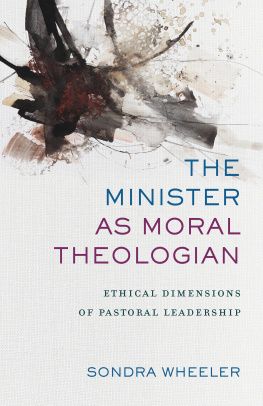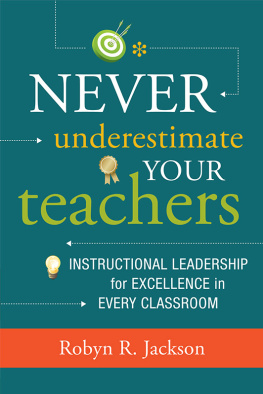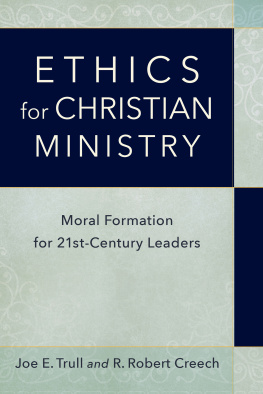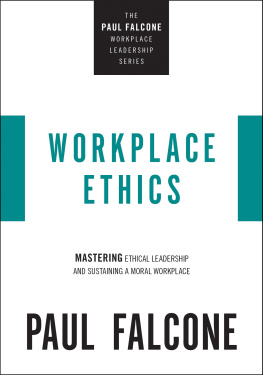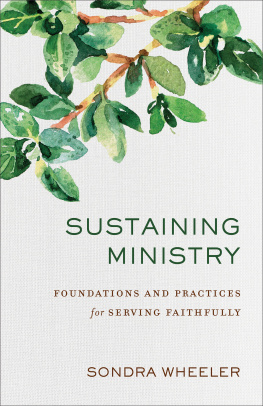Sondra Wheeler - The Minister as Moral Theologian: Ethical Dimensions of Pastoral Leadership
Here you can read online Sondra Wheeler - The Minister as Moral Theologian: Ethical Dimensions of Pastoral Leadership full text of the book (entire story) in english for free. Download pdf and epub, get meaning, cover and reviews about this ebook. year: 2017, publisher: Baker Publishing Group, genre: Religion. Description of the work, (preface) as well as reviews are available. Best literature library LitArk.com created for fans of good reading and offers a wide selection of genres:
Romance novel
Science fiction
Adventure
Detective
Science
History
Home and family
Prose
Art
Politics
Computer
Non-fiction
Religion
Business
Children
Humor
Choose a favorite category and find really read worthwhile books. Enjoy immersion in the world of imagination, feel the emotions of the characters or learn something new for yourself, make an fascinating discovery.
- Book:The Minister as Moral Theologian: Ethical Dimensions of Pastoral Leadership
- Author:
- Publisher:Baker Publishing Group
- Genre:
- Year:2017
- Rating:3 / 5
- Favourites:Add to favourites
- Your mark:
- 60
- 1
- 2
- 3
- 4
- 5
The Minister as Moral Theologian: Ethical Dimensions of Pastoral Leadership: summary, description and annotation
We offer to read an annotation, description, summary or preface (depends on what the author of the book "The Minister as Moral Theologian: Ethical Dimensions of Pastoral Leadership" wrote himself). If you haven't found the necessary information about the book — write in the comments, we will try to find it.
Sondra Wheeler: author's other books
Who wrote The Minister as Moral Theologian: Ethical Dimensions of Pastoral Leadership? Find out the surname, the name of the author of the book and a list of all author's works by series.
The Minister as Moral Theologian: Ethical Dimensions of Pastoral Leadership — read online for free the complete book (whole text) full work
Below is the text of the book, divided by pages. System saving the place of the last page read, allows you to conveniently read the book "The Minister as Moral Theologian: Ethical Dimensions of Pastoral Leadership" online for free, without having to search again every time where you left off. Put a bookmark, and you can go to the page where you finished reading at any time.
Font size:
Interval:
Bookmark:
2017 by Sondra Ely Wheeler
Published by Baker Academic
a division of Baker Publishing Group
P.O. Box 6287, Grand Rapids, MI 49516-6287
www.bakeracademic.com
Ebook edition created 2017
All rights reserved. No part of this publication may be reproduced, stored in a retrieval system, or transmitted in any form or by any meansfor example, electronic, photocopy, recordingwithout the prior written permission of the publisher. The only exception is brief quotations in printed reviews.
Library of Congress Cataloging-in-Publication Data is on file at the Library of Congress, Washington, DC.
ISBN 978-1-4934-1029-3
Unless otherwise indicated, Scripture quotations are from the New Revised Standard Version of the Bible, copyright 1989, by the Division of Christian Education of the National Council of the Churches of Christ in the United States of America. Used by permission. All rights reserved.
Scripture quotations labeled NIV are from the Holy Bible, New International Version. NIV. Copyright 1973, 1978, 1984, 2011 by Biblica, Inc. Used by permission of Zondervan. All rights reserved worldwide. www.zondervan.com
Scripture quotations labeled RSV are from the Revised Standard Version of the Bible, copyright 1952 [2nd edition, 1971] by the Division of Christian Education of the National Council of the Churches of Christ in the United States of America. Used by permission. All rights reserved.
To my students
over the last twenty-five years,
from whom I have learned much
of what I know about ministry
Cover
Title Page
Copyright Page
Dedication
Acknowledgments
Introduction: Why This Book?
1. The Minister as Ethicist
2. Preaching on Morally Difficult Texts and Occasions
3. Teaching about Moral Issues
4. Giving Moral Counsel
5. Serving as a Moral Example
Further Reading
Index
Back Cover
Books, even those with individual authors, are always collaborative efforts. As a writer you are in conversation with other writers, both those you know personally and those you meet only in print. For a book like this one, which draws extensively on years spent talking with students at all levels of ministry experience and on formal and informal consultations with ministers across a wide variety of traditions and settings, the sense of a collective labor is particularly strong. Whatever insight it has to offer is the fruit of a community of students, thinkers, and practitioners experimenting with the possibilities and wrestling with the perils of leading the church as a moral community. The books dedication to the students I have taught over twenty-five years is in happy recognition of some of that debt.
A few members of the community of scholars and practitioners deserve special mention here because their long association with the author made them liable to be called upon for ideas and feedback, in response to which they were uniformly gracious and helpful. In this category belong my teaching colleagues Daniel Mejia and Joe Bush, and my onetime seminary classmate Anna Verlee Copeland, now a pastor in Maine. I also thank Tom Berlin, pastor and chairman of the board of Wesley Seminary where I teach, whose feedback and encouragement were invaluable, and Mandy Sayers, an alum of our school who is both a fine minister and a meticulous editor.
Finally, I must mention a few scholars whose work in this area has been particularly provocative and helpful to me as a thinker and teacher: Rebekah Miles, who first gave me the idea that pastors could call upon congregants to do their moral homework; Richard Gula, whose work on the professional character of ministry offered me new ways of thinking about power; and Margaret Farley, whose reflections on the sustenance or failure of human commitments continues to illuminate both my work and my life. For the wisdom and insight they have brought to our shared field, I am grateful.
WHY THIS BOOK?
Thirty years ago, when I was in seminary, literature on the ethics of pastoral ministry was remarkably sparse. What material did exist had more to do with manners and professional etiquette than with the moral problems that arise in ministry, and offered little in the way of tools for analysis or standards for judgment. Gaylord Noyce, longtime professor of pastoral theology at Yale Divinity School, was among the first to address this problem with his 1988 book Pastoral Ethics . In this work, he used the then-developing field of professional ethics to provide a framework for reflecting on the responsibilities of clergy.
In the decades since, many other writers have turned their attention to this topic. Recent books in the field are numerous, and many offer sound judgment and good practical advice. Among the general texts I have found useful in my many years of seminary teaching are Rebekah Miless The Pastor as Moral Guide , William Willimons Calling and Character , Joe Trull and James Carters Ministerial Ethics , Richard Gulas Ethics in Pastoral Ministry These books provide various sorts of help, whether as broad moral and theological resources for understanding the particular ministry of the ordained or as carefully developed arguments for the nature of moral obligations in ministry. Some offer detailed accounts of what is at stake and what harm is done when professional norms are violated. Others enter into particular debates about the duties of confidentiality and their limits, the possibilities and risks of friendship between pastors and congregants, and the challenges of balancing professional obligations with personal and family life.
In addition, there is an emerging literature focused more narrowly on pastoral sexual misconduct, its patterns, its effects, and appropriate responses to it. Beginning with the seminal work of Marie Fortune, Other relevant works could also be cited, including a number of denominational statements. Most of these texts offer analyses of why such misconduct is so serious and so destructive along with practical guidance and strategies for establishing and maintaining necessary boundaries, and all articulate clear standards of conduct.
Given all of this it is reasonable to ask, Why another book on this subject? My answer to this sensible question is twofold. First, I am interested in calling attention to all the dimensions of pastoral ministry that involve ministers deeply in work we normally assign to the province of Christian ethics. This is not simply a matter of a particular clergypersons intellectual interests or preferences. The ordinary practice of ministry requires pastors to serve as moral theologians within their congregations. It is demanded by the nature of their regular work as preachers and teachers and givers of counsel as well as by the role they inhabit as visible leaders of communities of faith. In fact, pastors will be teaching ethics, whether consciously or not, by how they handle (or avoid) biblical passages that are morally challenging or troubling; they will be giving moral lessons by what issues they address or ignore and by what they say about those with whom they disagree on those issues. They will be shaping character by what they say or leave unsaid in the counseling session and by how they respond to the behavior, praiseworthy or otherwise, that is displayed in the communities they lead. Furthermore, they will be continually speaking with their lives, as the Quakers say, for they will be taken as moral exemplars and role models (whether wisely and fairly or not), which is an aspect of the office that cannot be ignored.
Recognizing that the minister bears special responsibility for the moral formation of youth and adults alike invites reflection about the nature of leadership and care in a congregation, a body that must be a moral community if it is to maintain its identity as the church. The work of formation requires not only explicit teaching and preaching but also fostering relationships that balance patience and humility with the willingness to confront issues honestly. All of these aspects of pastoral ministry call out for the need to address the particular character of moral leadership and for practical tools and guidance. Yet these topics receive very little attention in books in ministerial ethics, which tend to focus on ethics for ministers rather than on ministers as ethicists. I hope to remedy this deficiency.
Font size:
Interval:
Bookmark:
Similar books «The Minister as Moral Theologian: Ethical Dimensions of Pastoral Leadership»
Look at similar books to The Minister as Moral Theologian: Ethical Dimensions of Pastoral Leadership. We have selected literature similar in name and meaning in the hope of providing readers with more options to find new, interesting, not yet read works.
Discussion, reviews of the book The Minister as Moral Theologian: Ethical Dimensions of Pastoral Leadership and just readers' own opinions. Leave your comments, write what you think about the work, its meaning or the main characters. Specify what exactly you liked and what you didn't like, and why you think so.

